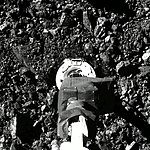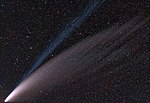Ophiuchus Supercluster
| Ophiuchus Supercluster | |
|---|---|
 The local Universe, including the Ophiuchus Supercluster | |
| Observation data (Epoch J2000) | |
| Constellation(s) | Ophiuchus |
| Right ascension | 17h 10m 00s |
| Declination | −22° 00′ 00″ |
| Redshift | z= 0,028 |
| Distance | 370 Mly |
Ophiuchus Supercluster is a nearby galaxy supercluster in the constellation Ophiuchus.[1][2] The supercluster forms the far wall of the Ophiuchus Void; it may also be connected in a filament with the Pavo-Indus-Telescopium Supercluster and the Hercules Supercluster.[2][3] This supercluster is centered on the cD cluster (Abell class type I) Ophiuchus Cluster, and has at least two more galaxy clusters, four more galaxy groups, and several field galaxies as members.
In February 2020, astronomers reported that a 1.5 million light-year wide cavity in the Ophiuchus Supercluster originated from the central galaxy of the Ophiuchus Cluster. The cD galaxy, NeVe 1, is the site of the Ophiuchus Supercluster eruption, triggered by the ejection of ~270 million solar masses from the supermassive black hole of NeVe 1, called WISEA J171227.81-232210.7. This may be the largest known explosion in the Universe since the Big Bang.[4][5][6][7]
Discovery
[edit]Ken-ichi Wakamatsu of Gifu University and Matthew Malkan discovered Ophiuchus Cluster in 1981 on Palomar Schmidt IV-N Plates during a hidden globular cluster survey.[1] Perhaps, determining characteristics of a supercluster will help to more correctly explain the excess velocity component of the local group of galaxies.[2]
References
[edit]- ^ a b Wakamatsu, Ken-ichi (January 2000). "The Ophiuchus Supercluster Observed with FLAIR". Retrieved 18 April 2019.
- ^ a b c Okamura, Sadanori; Karoji, Hiroshi; Jugaku, Jun; Parker, Quentin A.; Menzies, John W.; Sekiguchi, Kazuhiro; Malkan, Matthew; Wakamatsu, Ken-ichi; Hasegawa, Takashi (1 August 2000). "Large-scale structure of galaxies in the Ophiuchus region". Monthly Notices of the Royal Astronomical Society. 316 (2): 326–344. Bibcode:2000MNRAS.316..326H. doi:10.1046/j.1365-8711.2000.03531.x.
- ^ Mysteries of the Milky Way. The Rosen Publishing Group. 2008. p. 129. ISBN 978-1-4042-1404-0.
- ^ Giacintucci, S.; Markevitch, M.; Johnston-Hollitt, M.; Wik, D. R.; Wang, Q. H. S.; Clarke, T. E. (2020-02-27). "Discovery of a giant radio fossil in the Ophiuchus galaxy cluster". The Astrophysical Journal. 891 (1): 1. arXiv:2002.01291. Bibcode:2020ApJ...891....1G. doi:10.3847/1538-4357/ab6a9d. ISSN 1538-4357. S2CID 211020555.
- ^ Overbye, Dennis (6 March 2020). "This Black Hole Blew a Hole in the Cosmos – The galaxy cluster Ophiuchus was doing just fine until WISEA J171227.81-232210.7 – a black hole several billion times as massive as our sun – burped on it". The New York Times. Retrieved 6 March 2020.
- ^ "Biggest cosmic explosion ever detected left huge dent in space". The Guardian. 27 February 2020. Retrieved 6 March 2020.
- ^ "Astronomers detect biggest explosion in the history of the Universe". Science Daily. 27 February 2020. Retrieved 6 March 2020.



